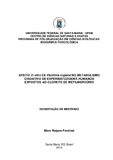| dc.creator | Fantinel, Mara Rejane | |
| dc.date.accessioned | 2012-11-12 | |
| dc.date.available | 2012-11-12 | |
| dc.date.issued | 2012-02-14 | |
| dc.identifier.citation | FANTINEL, Mara Rejane. Effect of Paullinia cupana in vitro oxidative metabolism human sperm exposed to chloride methylmercury. 2012. 89 f. Dissertação (Mestrado em Ciências Biológicas) - Universidade Federal de Santa Maria, Santa Maria, 2012. | por |
| dc.identifier.uri | http://repositorio.ufsm.br/handle/1/11188 | |
| dc.description.abstract | Investigations suggests that methylmercury (MeHg) toxicitiy is related to
oxidative stress promotion caused by lipid peroxidation of cell membranes as well as
genotoxicity. The methylmercury (MeHg) exposition causes production of adverse
effects as deterioration of semen quality, testicular degeneration, and male
reproductive failure. Since human sperm is a vulnerable cell investigations analyzing
the antioxidant protection of plant extracts on MeHg exposition is relevant. Among
Brazilian food supplements we found guaraná (Paullinia cupana, Mart.) which is rich
in caffeine, other metaxanthynes and catechins. Previous studies showed that
guaraná present antioxidant, antimutagenic, anticarcinogenic properties that could
exert protective effect of sperm cells exposed to MeHg. Therefore, an in vitro
protective role of guaraná (Paullinia cupana, Mart.) viability and oxidative stress
modulation of human sperm cells exposed to methylmercury intoxication was here in
investigated. The human sperm cell collected from donators were counted, aliquoted
and submitted to four treatments negative control (C), MeHg exposition (MeHg, 60
μM); (3) Guaraná supplementation (Gua, 10 mg/mL) and MeHg exposition plus
guaraná suplementation (MeHg-Gua). During the treatment exposition the samples
were maintained at 37oC at 95% CO2 incubation. The viability of spermatozoa was
analyzed by MTT reduction assay. Lipoperoxidation was estimated by determination
of the thiobarbituric acid derivative of MDA (TBA-MDA) using a sensitive highperformance
liquid chromatographic (HPLC), reactive oxygen species (ROS) was
verified by testing with fluorimetric 2′ 7′-dichlorofluorescein diacetate (DCFH-DA)
assay. Protein carbonylation and thiol were evaluated spectrophotometrically. The
guaraná treatment increase the sperm viability exposed to MeHg as well as
decreased the lipoperoxidation, ROS and protein carbonylation levels. Thus, we
conclude that the guaraná showed in vitro protective effect of human sperm against
MeHg exposition. | eng |
| dc.description.sponsorship | Coordenação de Aperfeiçoamento de Pessoal de Nível Superior | |
| dc.format | application/pdf | por |
| dc.language | por | por |
| dc.publisher | Universidade Federal de Santa Maria | por |
| dc.rights | Acesso Aberto | por |
| dc.subject | Mercúrio | por |
| dc.subject | Toxicidade | por |
| dc.subject | Guaraná | por |
| dc.subject | Espermatozóides | por |
| dc.subject | Infertilidade | por |
| dc.subject | Mercury | eng |
| dc.subject | Toxicity | eng |
| dc.subject | Guarana | eng |
| dc.subject | Sperm | eng |
| dc.subject | Infertility | eng |
| dc.title | Efeito in vitro de Paullinia cupana no metabolismo oxidativo de espermatozóides humanos expostos ao cloreto de metilmercúrio | por |
| dc.title.alternative | Effect of Paullinia cupana in vitro oxidative metabolism human sperm exposed to chloride methylmercury | eng |
| dc.type | Dissertação | por |
| dc.description.resumo | Investigations suggests that methylmercury (MeHg) toxicitiy is related to
oxidative stress promotion caused by lipid peroxidation of cell membranes as well as
genotoxicity. The methylmercury (MeHg) exposition causes production of adverse
effects as deterioration of semen quality, testicular degeneration, and male
reproductive failure. Since human sperm is a vulnerable cell investigations analyzing
the antioxidant protection of plant extracts on MeHg exposition is relevant. Among
Brazilian food supplements we found guaraná (Paullinia cupana, Mart.) which is rich
in caffeine, other metaxanthynes and catechins. Previous studies showed that
guaraná present antioxidant, antimutagenic, anticarcinogenic properties that could
exert protective effect of sperm cells exposed to MeHg. Therefore, an in vitro
protective role of guaraná (Paullinia cupana, Mart.) viability and oxidative stress
modulation of human sperm cells exposed to methylmercury intoxication was here in
investigated. The human sperm cell collected from donators were counted, aliquoted
and submitted to four treatments negative control (C), MeHg exposition (MeHg, 60
μM); (3) Guaraná supplementation (Gua, 10 mg/mL) and MeHg exposition plus
guaraná suplementation (MeHg-Gua). During the treatment exposition the samples
were maintained at 37oC at 95% CO2 incubation. The viability of spermatozoa was
analyzed by MTT reduction assay. Lipoperoxidation was estimated by determination
of the thiobarbituric acid derivative of MDA (TBA-MDA) using a sensitive highperformance
liquid chromatographic (HPLC), reactive oxygen species (ROS) was
verified by testing with fluorimetric 2′ 7′-dichlorofluorescein diacetate (DCFH-DA)
assay. Protein carbonylation and thiol were evaluated spectrophotometrically. The
guaraná treatment increase the sperm viability exposed to MeHg as well as
decreased the lipoperoxidation, ROS and protein carbonylation levels. Thus, we
conclude that the guaraná showed in vitro protective effect of human sperm against
MeHg exposition. | por |
| dc.contributor.advisor1 | Cruz, Ivana Beatrice Mânica da | |
| dc.contributor.advisor1Lattes | http://lattes.cnpq.br/3426369324110716 | por |
| dc.contributor.referee1 | Rocha, Maria Izabel de Ugalde Marques da | |
| dc.contributor.referee1Lattes | http://lattes.cnpq.br/8282487927775392 | por |
| dc.contributor.referee2 | Leal, Daniela Bitencourt Rosa | |
| dc.contributor.referee2Lattes | http://lattes.cnpq.br/3639683273462361 | por |
| dc.creator.Lattes | http://lattes.cnpq.br/5570364071621144 | por |
| dc.publisher.country | BR | por |
| dc.publisher.department | Bioquímica | por |
| dc.publisher.initials | UFSM | por |
| dc.publisher.program | Programa de Pós-Graduação em Ciências Biológicas: Bioquímica Toxicológica | por |
| dc.subject.cnpq | CNPQ::CIENCIAS BIOLOGICAS::BIOQUIMICA | por |


